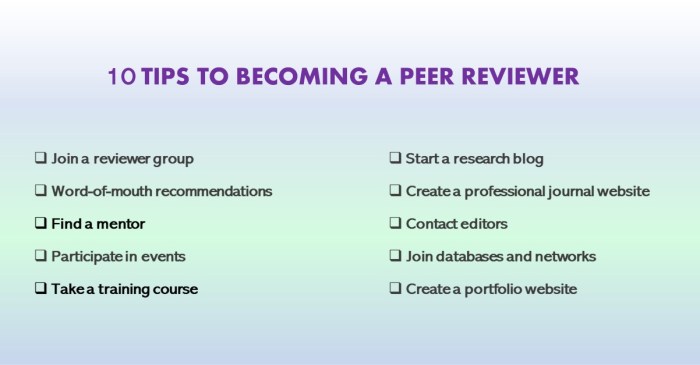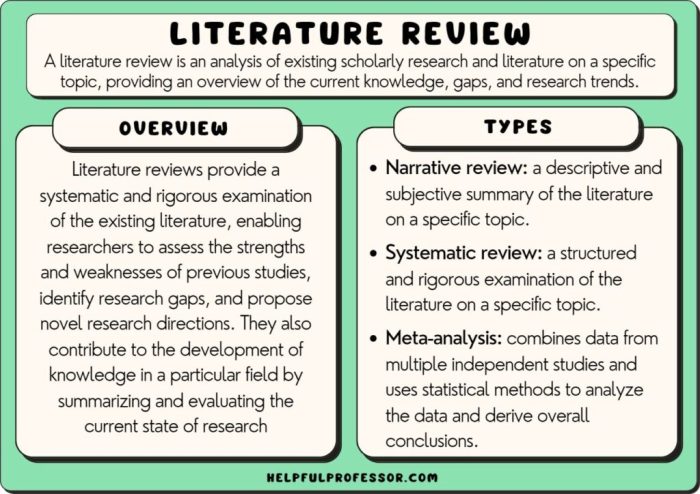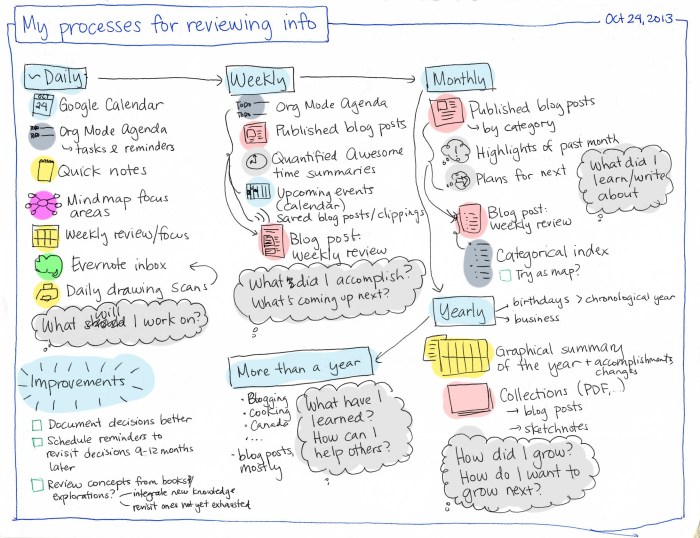How to make a reviewer – In today’s digital age, the role of reviewers has become increasingly crucial. From academic journals to online marketplaces, reviews provide valuable insights and guidance to readers and consumers alike. If you’re aspiring to become a reviewer, this comprehensive guide will equip you with the knowledge and skills to excel in this multifaceted field.
As we delve into the intricacies of reviewing, we’ll explore the different types of reviewers, establish clear review frameworks, craft constructive feedback, and effectively communicate review findings. We’ll also delve into ethical considerations and continuous improvement strategies to ensure your reviews are impactful and meet the highest standards.
Understanding the Reviewer’s Role
In the world of research and scholarship, reviewers play a pivotal role in ensuring the quality and rigor of academic work. Their responsibilities extend beyond simply checking for errors and inconsistencies; they are tasked with evaluating the overall merit and significance of a research project or publication.
Reviewers come from diverse backgrounds and may have different areas of expertise. They can be academic peers, industry professionals, or even consumers who provide feedback on products or services. Regardless of their background, effective reviewers share a common set of qualities and skills:
Objectivity and Impartiality
- Reviewers must be able to assess a work objectively, without bias or personal preferences.
- They should consider the work’s strengths and weaknesses without being influenced by the author’s reputation or affiliations.
Expertise and Knowledge
- Reviewers should have a deep understanding of the subject matter of the work they are reviewing.
- This expertise allows them to evaluate the work’s technical accuracy, methodological soundness, and originality.
Critical Thinking and Analytical Skills
- Reviewers must be able to critically analyze a work and identify its strengths and weaknesses.
- They should be able to evaluate the work’s arguments, evidence, and conclusions, and identify any logical fallacies or gaps in reasoning.
Communication Skills
- Reviewers must be able to communicate their feedback clearly and concisely.
- They should be able to provide constructive criticism and suggestions for improvement, while also being respectful of the author’s work.
Developing a Review Framework
A structured review framework is crucial for ensuring consistent and fair evaluations. Here’s how to develop one:
Establishing Clear Review Criteria
Define specific criteria against which submissions will be assessed. These should be objective, measurable, and relevant to the review’s purpose. Examples include clarity, originality, and technical accuracy.
Designing a Structured Review Process
Create a clear process for reviewing submissions, including timelines, communication channels, and decision-making procedures. This ensures transparency and accountability.
Evaluating and Scoring Submissions
Establish a scoring system that aligns with the review criteria. Consider using a rubric or checklist to guide reviewers and ensure consistency. Provide clear instructions on how to apply the scoring system and resolve any discrepancies.
Writing Constructive Feedback
Providing constructive feedback is crucial for fostering growth and improvement. Here are some guidelines to help you craft effective and balanced reviews:
Balancing Positive and Negative Feedback
- Acknowledge the reviewer’s strengths and areas where they excel.
- Provide specific examples of positive aspects of the review.
- Use positive language to frame constructive criticism.
Communicating Review Findings

Effectively communicating review findings is crucial for ensuring that stakeholders understand the results and can take appropriate action. There are various methods for presenting review results, each with its own advantages and disadvantages.
Written reports are a common and comprehensive way to present review findings. They provide a detailed account of the review process, including the scope, methodology, and results. Written reports can be used to document the review findings for future reference and to share with a wide range of stakeholders.
Oral Presentations
Oral presentations are another effective way to communicate review findings. They allow the reviewer to present the results in a more personal and engaging way. Oral presentations can be used to highlight key findings and to answer questions from stakeholders.
Other Communication Channels
In addition to written reports and oral presentations, there are a number of other communication channels that can be used to communicate review findings. These include:
- Webinars
- Social media
The best communication channel for presenting review findings will depend on the specific audience and the nature of the findings.
Engaging with Stakeholders
Once the review findings have been communicated, it is important to engage with stakeholders to ensure that they understand the results and can take appropriate action. This may involve answering questions, providing additional information, or facilitating discussions.
Responding to Feedback
It is also important to be prepared to respond to feedback on the review findings. This may involve addressing concerns, clarifying misunderstandings, or making changes to the findings.
Ethical Considerations in Reviewing

Ethical principles should guide reviewers to ensure the integrity and objectivity of the review process. These principles include:
- Impartiality and Objectivity:Reviewers should approach the review with an open mind, free from biases or personal interests that could influence their judgment.
- Confidentiality:Reviewers must maintain the confidentiality of the manuscript and any related information they receive during the review process.
- Respect for Intellectual Property:Reviewers should respect the intellectual property rights of the authors and avoid plagiarism or unauthorized use of their work.
- Disclosure of Conflicts of Interest:Reviewers should disclose any potential conflicts of interest, such as personal or professional relationships with the authors or their institutions, that could impair their ability to provide an unbiased review.
Mitigating Conflicts of Interest, How to make a reviewer
Potential conflicts of interest can be mitigated through various strategies:
- Recusal:Reviewers with significant conflicts of interest should recuse themselves from the review process.
- Disclosure:Reviewers should disclose any potential conflicts of interest to the editor or conference organizers.
- Blind Review:Blind reviews, where reviewers are unaware of the authors’ identities, can help reduce the influence of biases.
Continuous Improvement for Reviewers
Continuous improvement is essential for reviewers to maintain their effectiveness and credibility. By reflecting on their own practices, seeking feedback, and engaging in professional development, reviewers can identify areas for improvement and enhance their skills.
Self-Reflection and Improvement
Regular self-reflection allows reviewers to assess their strengths and weaknesses, identify areas for improvement, and develop strategies to address them. This can involve reviewing past reviews, seeking feedback from colleagues or supervisors, and attending workshops or webinars on best practices in reviewing.
Seeking Feedback
Feedback from colleagues, supervisors, or authors can provide valuable insights into a reviewer’s strengths and areas for improvement. Reviewers should actively seek feedback on their reviews, both positive and negative, and use it to identify areas where they can enhance their skills.
Professional Development Opportunities
Professional development opportunities, such as workshops, conferences, and online courses, can help reviewers stay up-to-date with best practices in reviewing and develop new skills. By attending these events, reviewers can learn about new techniques, share experiences with other reviewers, and network with experts in the field.
Staying Up-to-Date with Best Practices
The field of reviewing is constantly evolving, with new best practices and guidelines emerging regularly. Reviewers should make an effort to stay up-to-date with these changes by reading relevant literature, attending conferences, and participating in online discussions.
Final Review

By embracing the principles Artikeld in this guide, you’ll not only become a proficient reviewer but also contribute to the advancement of knowledge, empower informed decision-making, and shape the digital landscape we navigate today.
Question Bank: How To Make A Reviewer
What are the key qualities of an effective reviewer?
Objectivity, attention to detail, analytical thinking, strong communication skills, and a commitment to ethical principles.
How do I develop a clear review framework?
Establish specific criteria, define scoring rubrics, and ensure the review process is structured and transparent.
What is the importance of providing constructive feedback?
Constructive feedback helps authors and creators identify areas for improvement, foster growth, and enhance the quality of their work.